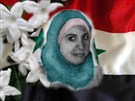[This is the ninth installment of Amal Hanano`s diary of her trip back to Aleppo. You can read previous posts here]
On the quietest Friday, a few weeks ago, I convinced my parents to honor a family tradition and go out for lunch. The narrow, cobblestoned streets were still and empty, as was the courtyard of one of my favorite restaurants, a renovated traditional house in the historic Jdeideh Quarter. The waiters hovered, not for news, but out of boredom, as they served the two lonely tables on what used to be their busiest day of the week. Bashar’s portrait reigned over us from the center of the iwan, and the state-run Syrian news channel buzzed in the background. Each of us kept an eye on the screen, trying to extract the grim news of the same Friday afternoon unfolding in other cities, where no one was out for lunch.
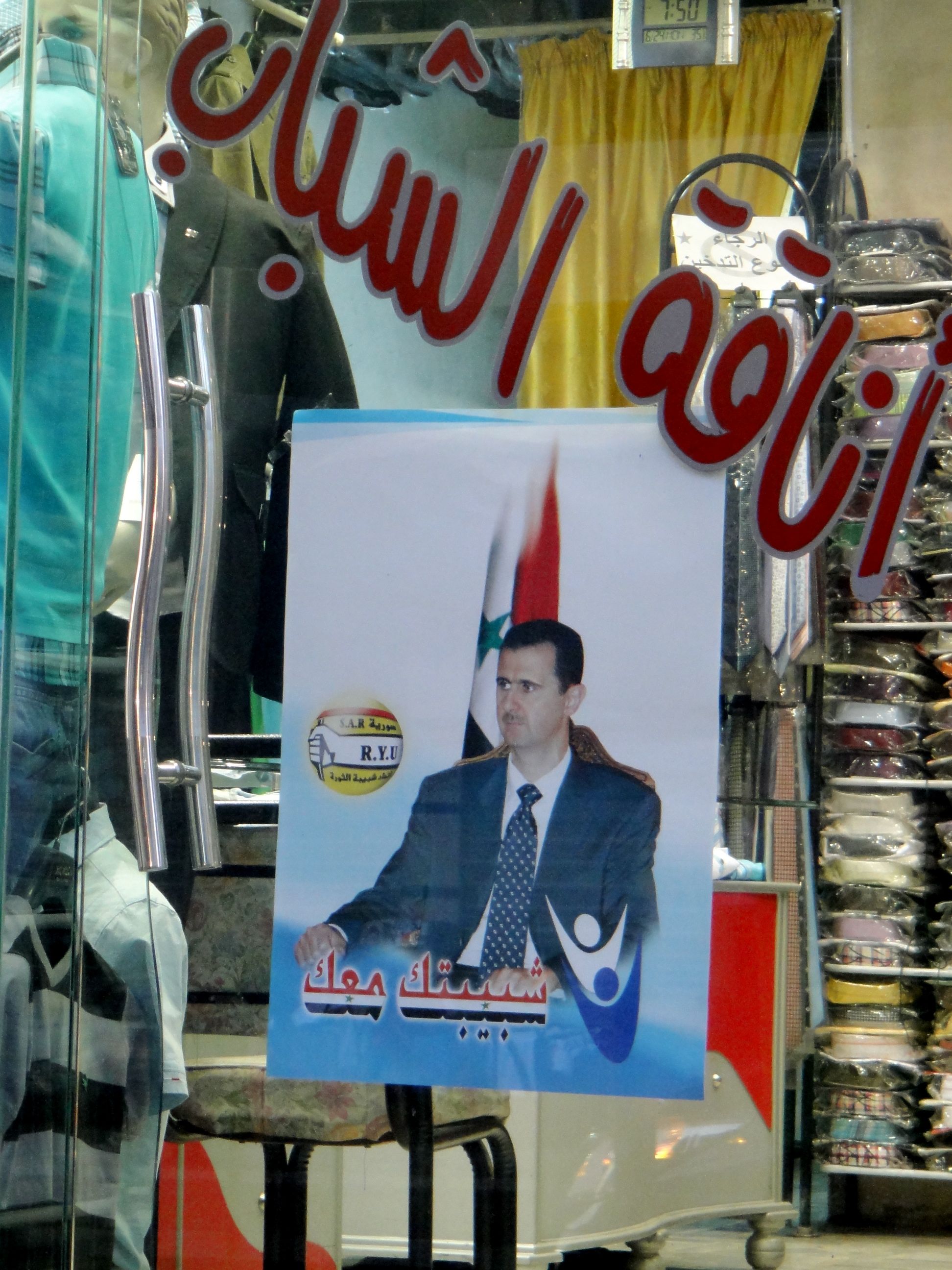
[A poster on the window of a store in Aleppo reads "Your Youth Are With You." Image by Amal Hanano]
I lower my voice and ask my father, had he heard the story of the donkey? He shook his head. So I leaned in closer, and told him about the protesters in Homs, during the first weeks of the uprising, who spray-painted “I am Bashar” on a donkey and let it roam free in the city. The next day, security forces had to shoot the mundess donkey that dared humiliate the Leader, and threaten national morale. As I spoke, I realized the difficulty of discreetly saying “Bashar,” because no matter how softly you whisper, you can’t avoid the harsh shhh in the middle. Even his name threatens us with its menacing, silencing heart. When I started to say it, my father raised an eyebrow, warning me. But when he heard the ending of the story, he chuckled. Then he began to laugh, loudly, uncontrollably, like I had not heard him laugh in a long time, and I joined him. Alarmed waiters moved closer, wondering what they had missed. In the sad, deserted restaurant, as Bashar’s eyes watched, and the stone walls listened, we laughed until our eyes watered. Every few minutes, we would just look at each other and start laughing again. At the absurdity of what we have become. Al-mudhik al-mubki, in the face of devastation, we laughed when we really wanted to cry.
This absurdity has infiltrated the minds of Syrians, infecting every political discussion, during which, at some point, someone will say: “It’s not Bashar, it’s the people around him.” Translation: everything that is happening in Syria has nothing to do with the president, his hands are tied, and it’s not his fault. So who is to blame? The answer varies: his father’s old guard; his rotten brother, cousin and brother-in-law; Iran; Qatar; Turkey; Israel; America; even Mars. Our president could not have known what happened to the school children of Daraa. Our president could not have authorized the killing and torture of peaceful protesters. Our president is a good man surrounded by evil forces out of his control. To back up this argument they will present his excuses: He has had a tough decade; he was not supposed to be president; he could not clean up the corruption he inherited; 9/11; Bush’s axis of evil; the neighboring Iraq war and one million Iraqi refugees inside Syria; taking the blame for Hariri’s assassination; and so on, the pity party is endless. And then the justifications: He is a doctor; his wife is beautiful and glamorous, she was even in Vogue; they are young and westernized, they are Bashma and hang out with Brangelina. And my favorite, “If Bashar could just leave on a plane right now to England, I’m sure he would. But he can’t, they won’t let him.” Really? Allah ma’u, good riddance. Although it is probably too late to hope for England as an exile destination, as we have forgotten “that Europe exits on the map,” according to Walid Muallim, our current Minister of Foreign Affairs.
When I ask, well, if it’s not him, then who is ruling us? They fall silent with empty eyes as all responsibility is passed to the unknown. If we don’t know who or what is in charge, then how can we fight it? It is out of our hands, and just like that, what could have been a constructive argument slips from reason to the realm of fate and mu’amara, conspiracy.
What is it about our president that convinces 97.6% of Syrians to vote for him? Why do people respond to and even envy our leader’s attributes? What makes him so irresistible? Is it his youth, his pale skin and blue eyes, his height, his western but not too western background, his education, and his flawless family? He is perfect on paper; triggering our automatic respect and adoration. This is how the regime’s publicity machine has successfully created a clean and innocent representation of Bashar, one that hovers above the turmoil, and miraculously makes the people feel sorry for his unfortunate predicament. As we know, according to Vogue, he became an eye surgeon “because it’s very precise, it’s almost never an emergency, and there is very little blood,” so the regime protects him from this chaotic, bloody disaster while Rami, Maher, and the “others” take the blame. Only his image remains, the unsoiled image, the omnipresent image... and we love the image.
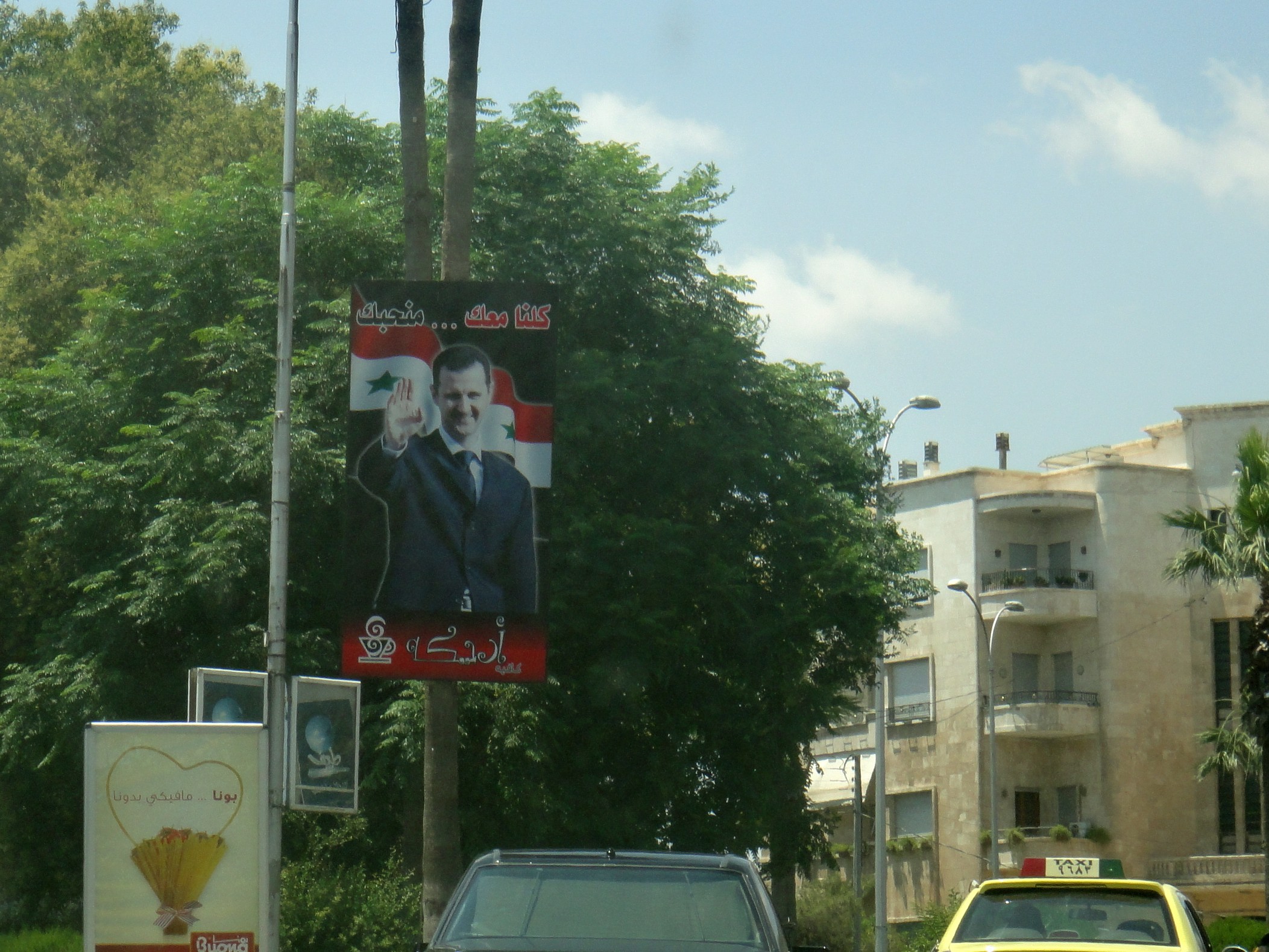
[A Billboard in Aleppo. "We Are All With You. We Love You." Image by Author]
The billboards that line the streets of Aleppo are like a fashion spread dedicated to Bashar’s image, posing with flags, with his father, in military uniform, in a suit, smiling, pointing, etc. Dramatic declarations in bold accompany him, minhibbak, we love you, and Suriyya al-Assad. Though his face is absent in the latest, “private,” branding campaign, a series of raised, green, right hands swearing, Ana ma’ Suriyya, “I am with Syria,” with captions like, my destiny is your destiny, my demands are your demands, and, my morsel is your morsel, he is still present, tying the future of every Syrian to his own. Posters, as well as people, also love the president’s most quotable quote, Suriyyah, Allah hamiya, “Syria, God protects her,” openly admitting he is not the country’s guardian. Is he being sarcastic? Or is he washing his hands of responsibility and blood, and leaving our fate in the hands of God?
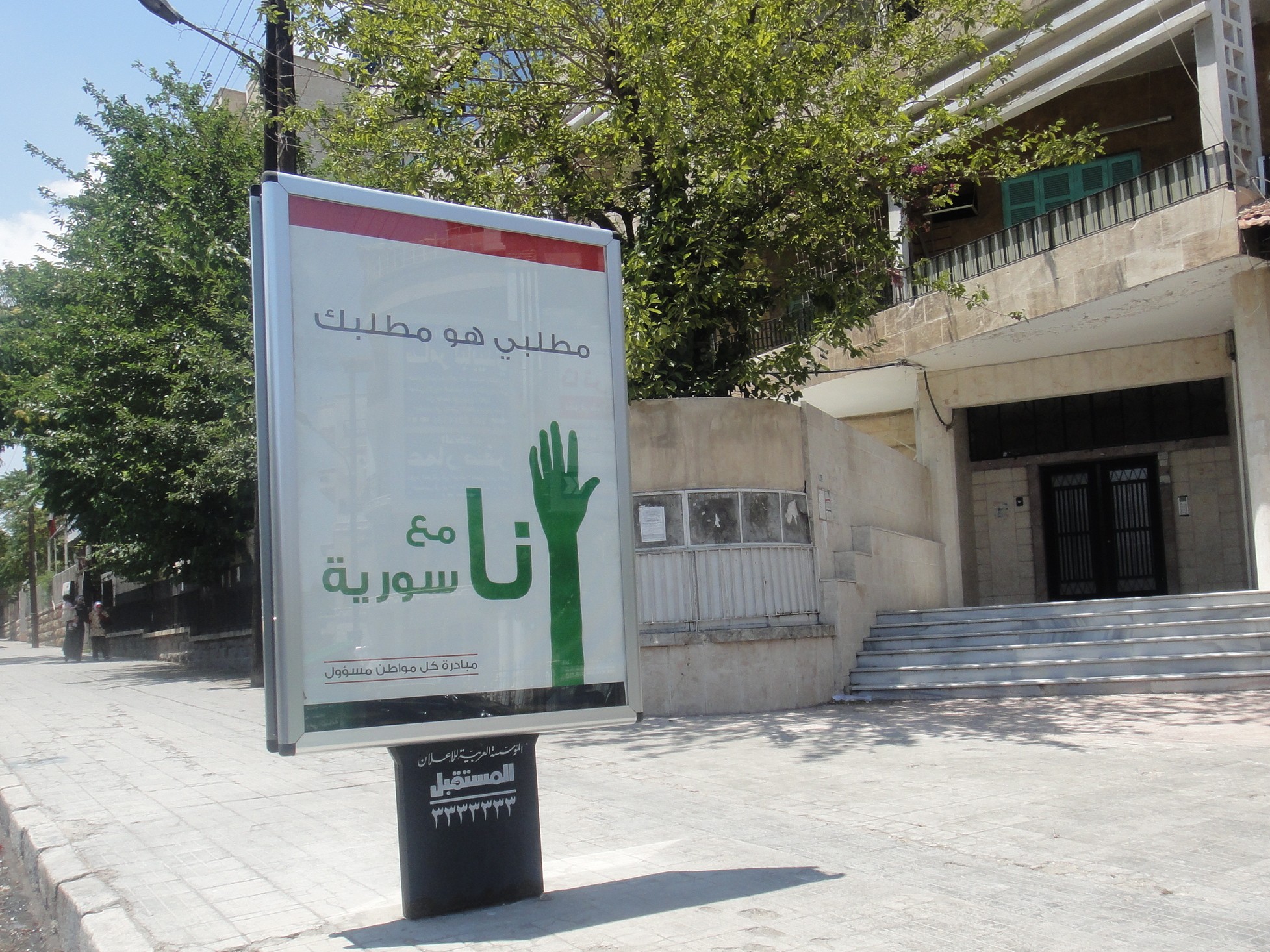
["I am with Syria." Image by Author]
Another unavoidable argument concerns “hysterical” expats like myself, who have been brainwashed by skewed media and limitless internet access. So, enlighten me, I ask, what should I be watching to get “the truth”? Two choices: Syrian TV and Addounia (an even more pro-regime outlet than the regime if you can imagine that is possible). This is shocking, because Syrian TV has always been a national joke. It was the ultimate propaganda machine since the days of Hafez, when he prohibited all other channels and banned satellite dishes. When Al Jazeera made its debut in the late ‘90s, Syrians were instantly hooked. After being forced for decades to watch the regime’s point of view, they were finally exposed to a cohesive, Arabic news channel that presented “the opinion and the other opinion” and, gasp, even criticized the Syrian regime. Every turbulent, political event of the last decade was watched and analyzed by Syrians via their main source of information, Al Jazeera.
My friend innocently asks me, “One thing I don’t understand, we watched Al Jazeera for years. Does that mean it had always been lying?” Her husband’s face reddens in blotches as I look at her, thinking, are you kidding me? I respond, “No, sweetie, it only lies when it is reporting on Syria.” She seems relieved, my sarcasm slips undetected, and her selective reasoning restored. Would she be willing to believe that the Iraq war never happened, or that Hariri was never assassinated? Because they religiously followed those events on Al Jazeera, back when it was an unbiased channel without a personal agenda to sabotage the country.
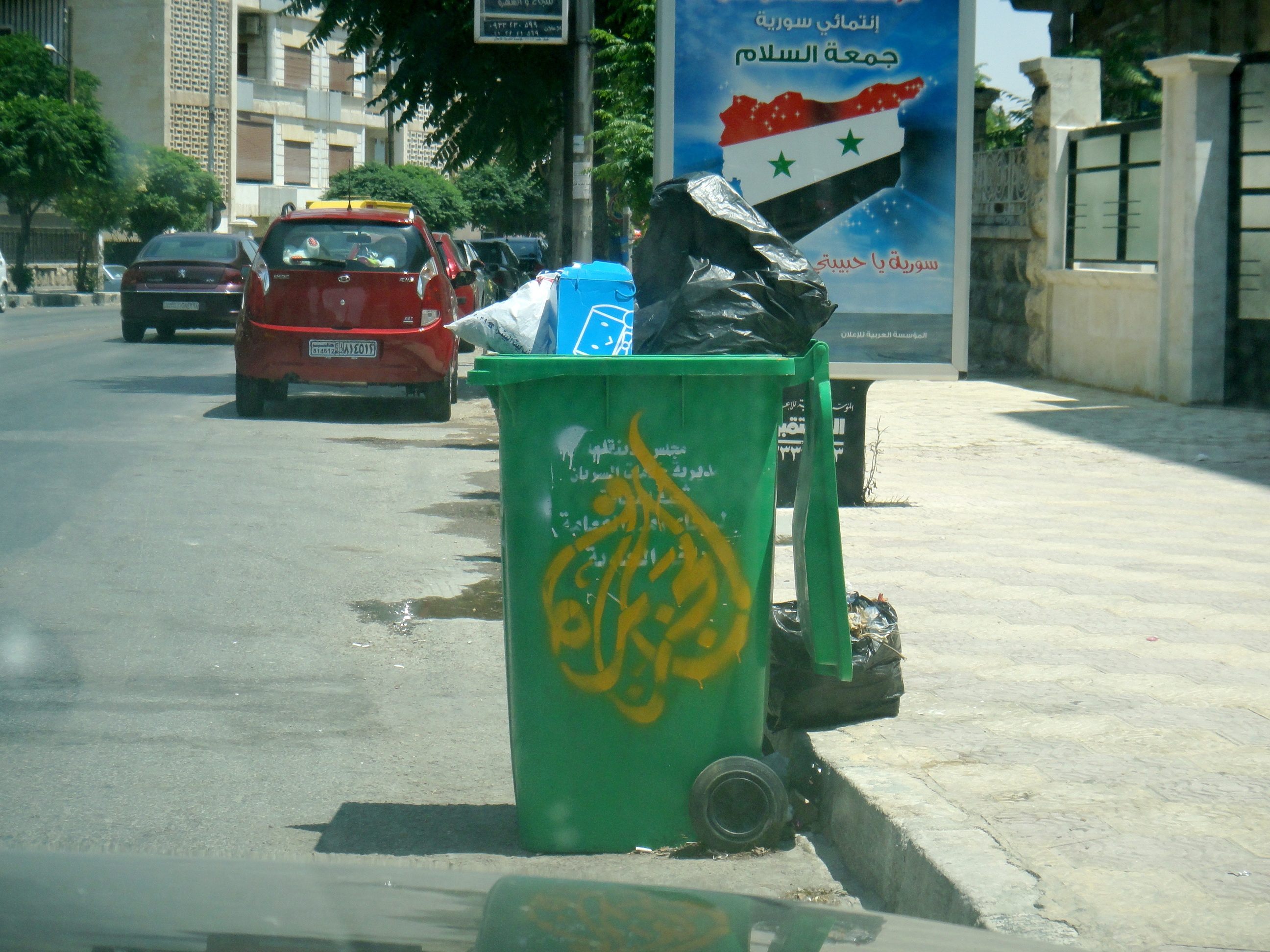
[Al-Jazeera`s logo spray-painted on a garbage dumpster in Aleppo. Image by Author]]
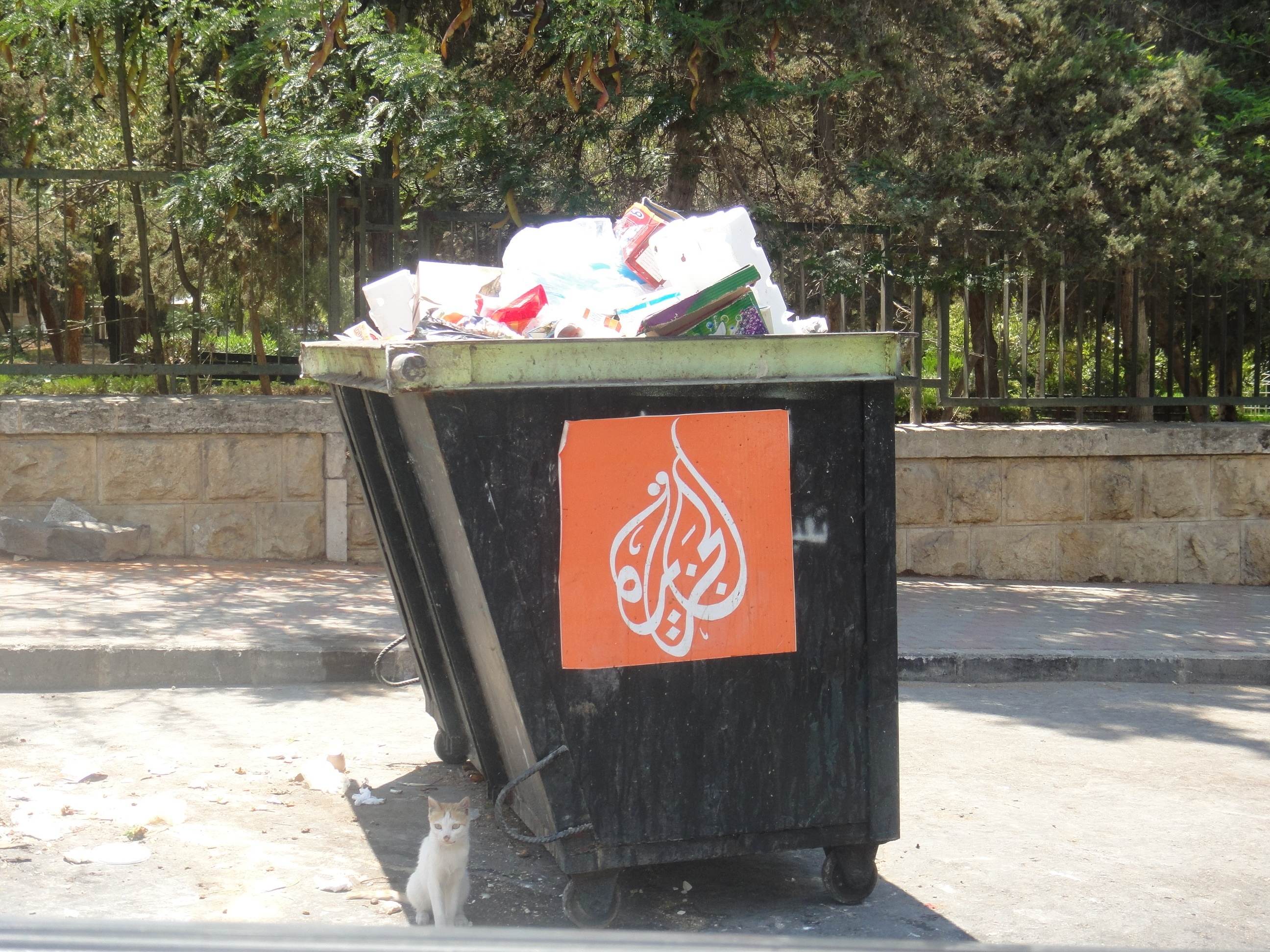
[Al-Jazeera`s logo spray-painted on a garbage dumpster in Aleppo. Image by Author]
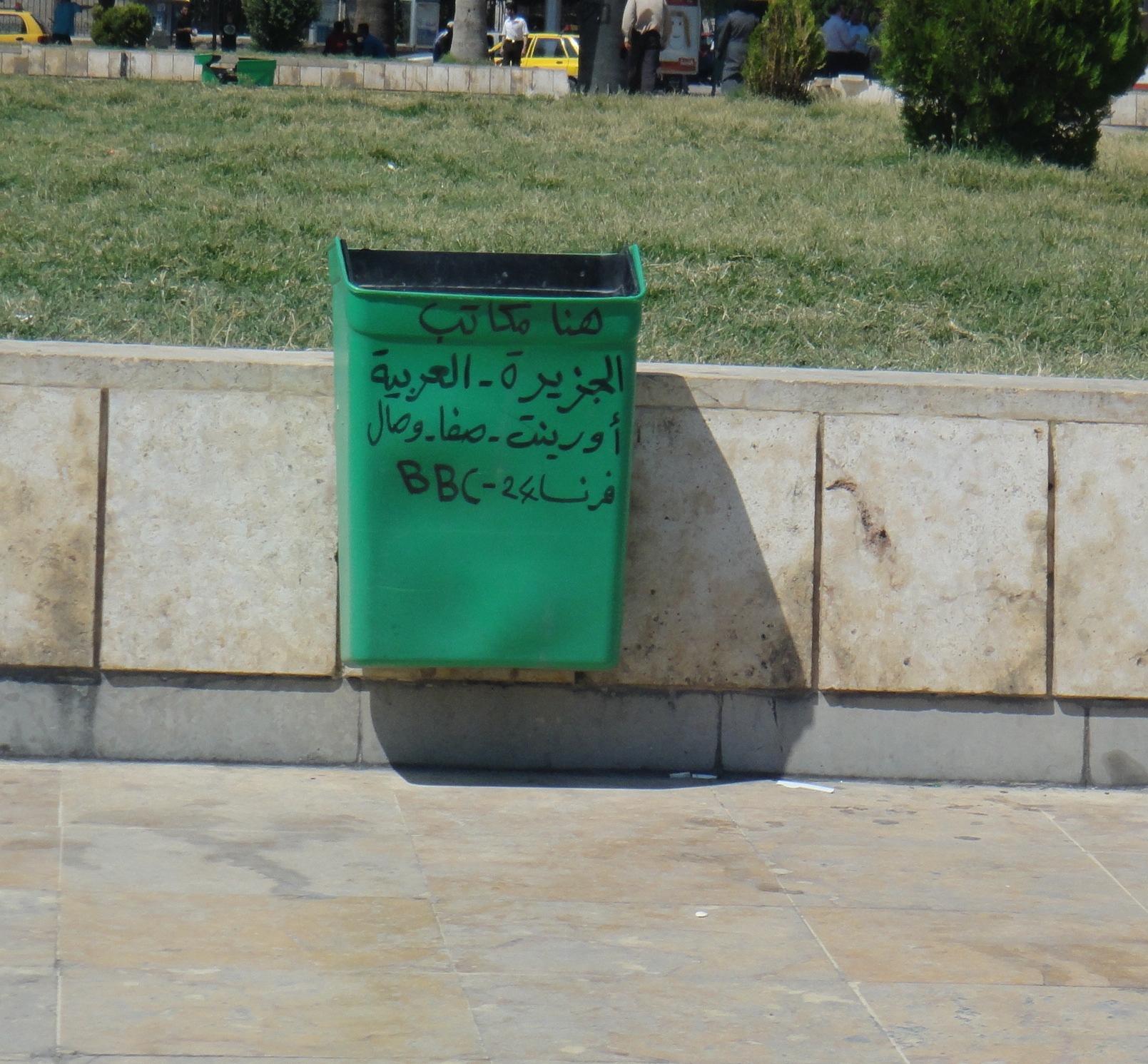
["The Offices of al-Jazeera, al-Arabiyya, Orient, France-24, BBC are Here." Image by Author]
So, what do Syrians think of their beloved Al Jazeera now? The garbage dumpsters of Aleppo, spray-painted with its logo say it all. It’s “official name” is Al Jazeera al-Haqira, “Despicable Jazeera” the leader of the Qanawat al-Mundesseh, “The Infiltrators’ Channels,” like Al Arabiya, Alhurra, France 24, CNN, BBC, and any other channel that dares broadcast “fabricated and exaggerated” reports on the protests and the government’s violent response instead of focusing on the real story that plagues us: The Universal Conspiracy.
And finally, if you are able to get past the first two issues, you will face the ultimate question: what is the badeel, the alternative? Because, these otherwise intelligent, worldly people, who understand global politics, who have the audacity to criticize America’s messy democratic process and two-party bickering, these same people truly believe out of 23 million Syrians, only Bashar al-Assad is fit to rule Syria. We should be asking the exact opposite question, if we cannot find a leader among us, what does it say about our society? That Syrians can only be ruled by the politics of fear?
My grandmother told me once, that the girls her age who grew old and never married, their naseeb, destiny were killed in the war. Syria, our 65-year-old maiden, do you know where her destiny may have been? Maybe our true leader is one of the hundreds of thousands imprisoned under the father & son’s rule, maybe our next president was one of the tens of thousands who were murdered. When a regime has developed a society without leaders, and cultivated a succession of paralyzed, apathetic generations, looking for the alternative seems like an impossible dream.
One of the most moving chants of this revolution is al-mawt wa la al-mazalleh, “We would rather die, than be humiliated.” They chant against humiliation, not murder, not torture, not rape, not imprisonment, just against the shame of submitting to live with heads bowed low. For the deluded Syrians who still believe their karameh, dignity remains in tact: as long as you need a bribe to get anything done; as long as you fear to speak your mind; as long as his picture hovers above you by force; then all of you, no exclusions, from the powerful to the marginalized, experience daily humiliation. It is the one trait that unites us all.
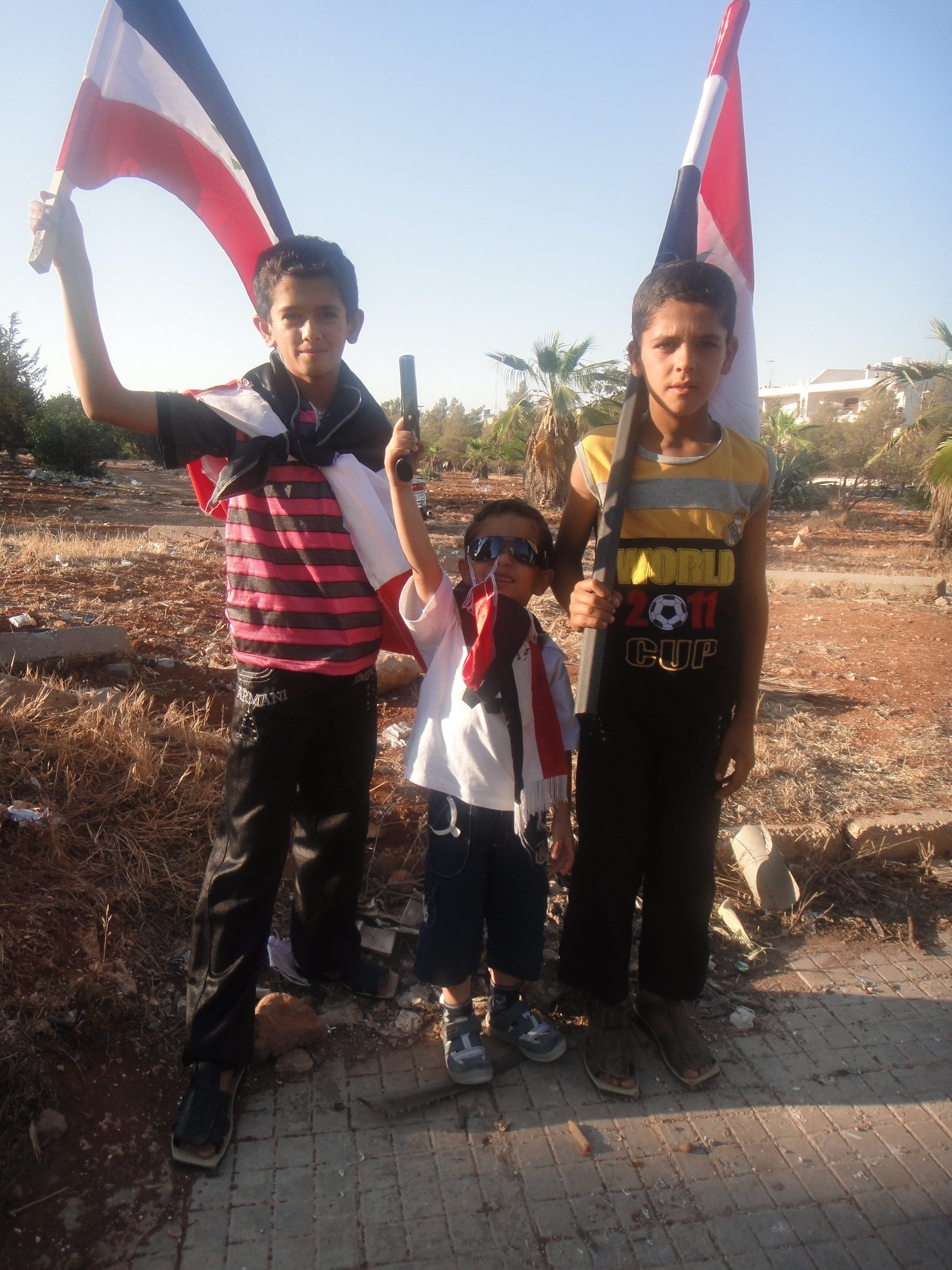
[Children acting "as if." Image by Author]
In Ambiguities of Domination, Lisa Wedeen makes a powerful argument that citizens of authoritarian governments learn to always act “as if.” We were trained for decades to act “as if” we loved the father, “as if” we loved the son, “as if” we had no other choice. But somewhere along the way, we stopped acting as if and just believed. Because if you lie that same lie often enough, it becomes true.
The image is all the regime has left, and it is as thin as the paper it is printed on. Our president is a two-dimensional graphic with no substance, and that is both the brilliance and devastation of the plot. We don’t want to believe the fallacy of the image of perfection, because we don’t want to face what the glaring blemishes really represent: humiliation en masse.
We are living in the absurd that makes us weep as we laugh, where a lion is threatened by a donkey, and people revere an image because there is no alternative. Is this what we have become?
The painful truth? It’s not him, it’s not them. It’s us.*
* I initially thought this was too negative an ending, one that doesn’t express the uplifting aspects of the Syrian uprising. But, the recent images from Hama and Homs prove not only is the president willing to massacre the people, he sends his blood-soaked message on the morning before Ramadan to quell “the month of Fridays” ahead. Those of you who silently sit, watching corrupt news about your leader, the butcher, and are still asking “Who is to blame?” the people on the streets answered you on Friday. Did you hear them? “Your silence is killing us.”
![[Aleppo Restaurant. Image by Amal Hanano]](https://kms.jadaliyya.com/Images/357x383xo/Alepporest.jpg)


